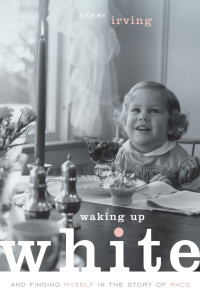Growing up as a white person I have spent most of my time encapsulated in a safe bubble surrounded by people that looked and thought exactly like me. I don’t think it is a very controversial statement to say that such an insular community is not very healthy; we need diversity in thought and culture to help us to appreciate our own and to grow together.
I have spent most of my life completely oblivious to the problems of race in America. I’m not color-blind, so I know problems and inequality do exist, but unfortunately the root of most of the issues is the elephant in the room of white supremacy (and the explicit and systemic racism that comes with trying to perpetuate or not dismantle it) which is too awkward and unknown a topic for most white people to ever really try to understand or address.

Irving very graciously and gently takes the reader through the various stages of her life as an oblivious person becoming a racial justice advocate, all the while examining the underlying lies and misconceptions people living in the majority-white culture often buy into without realizing it. Irving does a wonderful job of getting the reader, regardless of cultural and racial background, to investigate the biases and culture that may have been taken for granted as “normal.” The most powerful thing for me as a white Christian man coming from the Evangelical South was her clear discussion of White Anglo-Saxon Protestant (WASP) culture that has for a long time just about cemented itself as the “normal” or “default” American culture and thereby managed to hide its existence and all of its cultural quirks and idiosyncrasies as just the normal way for people to behave and think.
One big takeaway I got from this unabashed examination of my WASP culture is the damage that is done by buying into the idea of rugged individualism and the irrelevance of community or of addressing and being honest about conflicts instead of just trying to make surface level appearances as innocuous as possible. These are things that I just grew up assuming, but in reality are just peculiarities of my white, straight, male, southern Christian upbringing. Recognizing this doesn’t mean these traits are bad, or that they should be praised, but rather that they should be understood and examined closely to garner a fuller understanding of my own behaviors and expectations of others and make adjustments accordingly.
A whole lot of the tensions that exist in modern society come from people of different cultural backgrounds misunderstanding otherwise normal behaviors from other people and taking them to be signals of malicious intent. Of course there is lots of malicious intent out there, but even more insidious are some of the common results of majority-white culture WASP assumptions of individualism, conflict avoidance, and surface level perfection, among many others. These assumptions and behaviors, factored in with the historical positions of power and influence enjoyed by white people (a direct result of the historical exploitation of everyone else), serve to perpetuate white supremacy, or, even when that is combated without careful introspection you can get white-savior-ism and more harm than good (see: Betsy DeVos’ work on destroying neighborhood schools and shifting to charter schools).
A natural response for someone like me hearing these kinds of things is an immediate urge to go out and fix it (i.e. to individualistically achieve perfection and remove the irksome conflict at hand – a very WASPy kind of thing to do). Maybe I can and should, but before even trying I need to listen to the people of color I don’t understand and the marginalized who are affected to hear what they think, understand how they approach things differently, and plug into the preexisting organizations and communities already doing good work on these fronts.
This is just the first in a number of books dealing with these kinds of topics that I am reading and will discuss soon. If you are curious to learn or do more to understand these issues, one good thing you can do is listen to people and participate in what is already out there. Here is a quick list of a few good resources I’ve found useful that I will continually update:
- Showing Up for Racial Justice is a group dedicate to helping white people be allies in the struggle for racial justice.
- UnderstandingRace.org’s brief description of the development of housing segregation and inequality through the GI bill and redlining (Wikipedia articles).
- An analysis of the statistics on police violence disproportionately affecting black people in America.
- An old Atlantic article and something more recent from The Economist about the Prison-Industrial Complex (PIC) that is unprecedentedly destroying millions of American lives and increasingly influences politics in The South and beyond, and a group dedicated to fighting against the PIC.
- A concise curriculum for white people to educate themselves on race and racism in America.
- Legally, the ACLU and the Southern Poverty Law Center (which has great articles discussing many relevant topics) have done great work advocating in the courts on behalf of the marginalized. Donations go a long way, and there are often donation matching campaigns to raise even more money for them to continue operating.
- The Reformed African American Network has great editorial content as well as several incredible podcasts by (though not exclusively for) black people. Their content is geared towards reformed Christians, but being religious is by no means a requirement to appreciate their work. You may also like the Liturgists podcast episode on race as well. And my old pastor just posted a bit of reformed presbyterian church and race historical context on his Facebook page.
- If and when you may feel compelled to give money or volunteer with some charity or organization, consider checking out Charity Navigator, which investigates how charities work and whether they do more harm than good.
3 thoughts on ““Waking Up White” by Debbie Irving”